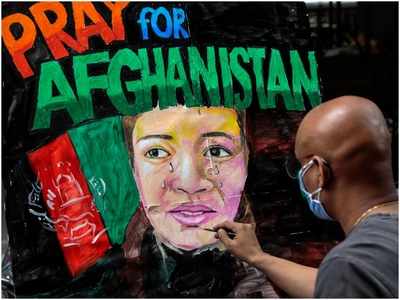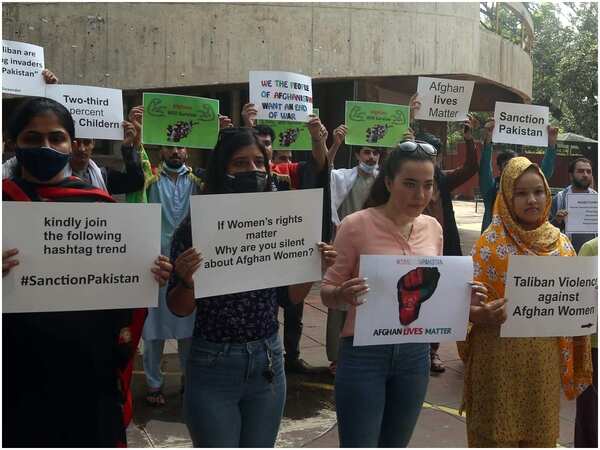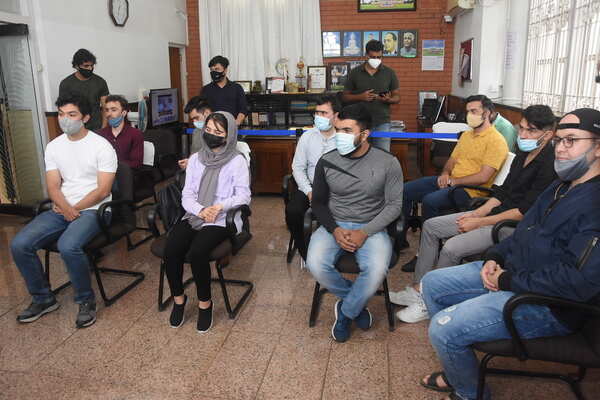- News
- entertainment
- events
- pune
- Help and support pours in for Pune’s Afghan student community
Trending
This story is from August 19, 2021
Help and support pours in for Pune’s Afghan student community
Ever since the Taliban seized power in Afghanistan, fear has gripped Afghan students living in India due to the situation in their home country. Pune is currently home to more than 100 Afghan students and it’s been a harrowing time for them as they make multiple phone calls back home, seek help from their colleges and NGOs, and appeal for visa extension to stay back in India.

Ever since the Taliban seized power in Afghanistan, fear has gripped Afghan students living in India due to the situation in their home country. Pune is currently home to more than 100 Afghan students and it’s been a harrowing time for them as they make multiple phone calls back home, seek help from their colleges and NGOs, and appeal for visa extension to stay back in India. Their survival as well as that of their families is what they are worried about.
Their survival as well as that of their families is what they are worried about.
On Tuesday, a group of 11 students, mostly from Pune, met Maharashtra cabinet minister Aaditya Thackeray to seek support on visa extension, and discuss fee waivers and help for their families amid the crisis in Afghanistan.
After the meeting, Thackeray said, “We will inform the central government about their need for visa extension and migration of their families. We have assured them that they will not face financial problems with regard to their studies.”
A nightmare for students
Ahmad Faeiq Rahim, who graduated from SPPU in 2020, and currently lives in a remote province of Badakhshan in the northern part of Afghanistan, narrates the horrific experience that he and his fellow Afghans are facing. He says, "Since the American soldiers left Afghanistan, the situation got worse and the Taliban started shutting down schools, universities and many other institutes. They have banned music, shopping malls, and have taken weapons from the Afghan National Army and started searching door to door. We are living in constant fear."
Afghan girls studying in India face an uncertain future and are worried about their families back home. “Whatever we worked hard for will now be of no use. Our families are trying to escape the country and asking us not to contact them frequently because of security reasons. Even though we are receiving help here in Pune, we cannot focus on our studies and are having sleepless nights. Our families are in danger. I appeal to the Indian government to help us in this crisis,” says an Afghan student, on a condition of anonymity.
 Like their counterparts in Pune, Afghan students in Chandigarh condemned the violence in Afghanistan; (below) Afghan students met with University of Mysore authorities to ask for support in these testing times
Like their counterparts in Pune, Afghan students in Chandigarh condemned the violence in Afghanistan; (below) Afghan students met with University of Mysore authorities to ask for support in these testing times

Distress calls on the rise
Pune-based NGO Sarhad has set up a helpline for Afghan students and nationals living in Maharashtra, to counsel them, provide them with support, help them make arrangements to continue their education here and contact their relatives
in Afghanistan with the help of the central government.
Sanjay Nahar, founder-president of Sarhad, says, “We are receiving around 8-11 SOS and distress calls in a day seeking counselling, financial support, help in visa extension etc, from students living in the city as well as those who travelled back to Afghanistan amid the pandemic. In addition to setting up a helpline, we are in touch with students to assist them with all possible help, including arranging jobs for them and working with the state and central government to provide them with all help. We must not abandon the Afghan people in this crisis. They have stood by India and we must stand by them in this situation.”
Colleges and universities come together to help students
Besides Sarhad, universities, colleges, NGOs and the Afghan Student Association from Pune are working to find a solution too. Dr Vijay Khare, Director of International Centre, Savitribai Phule Pune University (SPPU), said in a recent meeting, “To avoid the psychological shock that they may go through, we are providing them with mental health support and strength that they need. The university is also thinking about Afghan students who are currently studying at SPPU through online mode, but are unable to attend classes due to some reasons so that their year is not wasted.”
Afghan students from SPPU also share that the university has called a meeting to extend their visas in India and they are being looked after well in the hostels. Nahar has urged city colleges to exempt fees of Afghan students as they may not be able to afford it right now. “Afghan students are studying in colleges and universities that are financially sound. I think the institutions can show a humanitarian gesture by waiving off their fee amid this crisis. It will be of great help for the students,” says Nahar.
‘Our parents cannot support us financially and we cannot work in India’
Dinesh Patnaik, director-general, The Indian Council for Cultural Relations (ICCR), has issued a statement that the students who are currently in India on ICCR scholarship will be taken care of. The statement also states that they will receive their stipends on time and can reside in hostels in their universities. However, it’s those who came here independently that might face a financial crisis. Afshaneh Shokuri, an Afghan student pursuing BBA in the city, says, “Back home, all the banks are closed and our families are out of work. They don’t have the money or means to support us here. Our visa policy does not allow us to work in India. At this point, we are absolutely helpless. We need money to survive but cannot be financially independent. We are getting help from Pune students and NGOs who are kind enough to open their homes for us to have meals and give us some money for basic needs. But how long do we continue to live in this survival mode? We also deserve to live a respectable life.”

On Tuesday, a group of 11 students, mostly from Pune, met Maharashtra cabinet minister Aaditya Thackeray to seek support on visa extension, and discuss fee waivers and help for their families amid the crisis in Afghanistan.
Students of Afghanistan origin, studying and residing in Pune, called on me with their various concerns regarding their education, future and stay/ return.
— Aaditya Thackeray (@AUThackeray) August 17, 2021
I heard them out and have assured them to convey it to the Govt of India. pic.twitter.com/abtFwpvJxT
After the meeting, Thackeray said, “We will inform the central government about their need for visa extension and migration of their families. We have assured them that they will not face financial problems with regard to their studies.”
Meanwhile, students are living in stress and fear. “I would rather die here in India than going back to Afghanistan,” says a teary-eyed Omar, a student of Fergusson University, appealing for a visa extension as his visa nears an expiration. He shares, “Growing up in the 90s, we saw what the Taliban regime was like. No freedom, no justice, life in constant fear and darkness. I’m in a state of shock to witness my country falling into draconian times once again. India is our only hope. I urge everyone to help us and our families.”
A nightmare for students
Ahmad Faeiq Rahim, who graduated from SPPU in 2020, and currently lives in a remote province of Badakhshan in the northern part of Afghanistan, narrates the horrific experience that he and his fellow Afghans are facing. He says, "Since the American soldiers left Afghanistan, the situation got worse and the Taliban started shutting down schools, universities and many other institutes. They have banned music, shopping malls, and have taken weapons from the Afghan National Army and started searching door to door. We are living in constant fear."
Afghan girls studying in India face an uncertain future and are worried about their families back home. “Whatever we worked hard for will now be of no use. Our families are trying to escape the country and asking us not to contact them frequently because of security reasons. Even though we are receiving help here in Pune, we cannot focus on our studies and are having sleepless nights. Our families are in danger. I appeal to the Indian government to help us in this crisis,” says an Afghan student, on a condition of anonymity.


Distress calls on the rise
Pune-based NGO Sarhad has set up a helpline for Afghan students and nationals living in Maharashtra, to counsel them, provide them with support, help them make arrangements to continue their education here and contact their relatives
in Afghanistan with the help of the central government.
Sanjay Nahar, founder-president of Sarhad, says, “We are receiving around 8-11 SOS and distress calls in a day seeking counselling, financial support, help in visa extension etc, from students living in the city as well as those who travelled back to Afghanistan amid the pandemic. In addition to setting up a helpline, we are in touch with students to assist them with all possible help, including arranging jobs for them and working with the state and central government to provide them with all help. We must not abandon the Afghan people in this crisis. They have stood by India and we must stand by them in this situation.”
Colleges and universities come together to help students
Besides Sarhad, universities, colleges, NGOs and the Afghan Student Association from Pune are working to find a solution too. Dr Vijay Khare, Director of International Centre, Savitribai Phule Pune University (SPPU), said in a recent meeting, “To avoid the psychological shock that they may go through, we are providing them with mental health support and strength that they need. The university is also thinking about Afghan students who are currently studying at SPPU through online mode, but are unable to attend classes due to some reasons so that their year is not wasted.”
Afghan students from SPPU also share that the university has called a meeting to extend their visas in India and they are being looked after well in the hostels. Nahar has urged city colleges to exempt fees of Afghan students as they may not be able to afford it right now. “Afghan students are studying in colleges and universities that are financially sound. I think the institutions can show a humanitarian gesture by waiving off their fee amid this crisis. It will be of great help for the students,” says Nahar.
‘Our parents cannot support us financially and we cannot work in India’
Dinesh Patnaik, director-general, The Indian Council for Cultural Relations (ICCR), has issued a statement that the students who are currently in India on ICCR scholarship will be taken care of. The statement also states that they will receive their stipends on time and can reside in hostels in their universities. However, it’s those who came here independently that might face a financial crisis. Afshaneh Shokuri, an Afghan student pursuing BBA in the city, says, “Back home, all the banks are closed and our families are out of work. They don’t have the money or means to support us here. Our visa policy does not allow us to work in India. At this point, we are absolutely helpless. We need money to survive but cannot be financially independent. We are getting help from Pune students and NGOs who are kind enough to open their homes for us to have meals and give us some money for basic needs. But how long do we continue to live in this survival mode? We also deserve to live a respectable life.”
End of Article
FOLLOW US ON SOCIAL MEDIA








